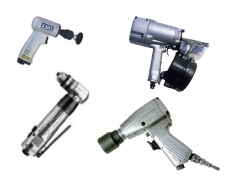Sometimes you may not be able to find air tool oil for your air tools, so you will need other lubricants, or substitutes, that you can use instead. This article will provide you with all the relevant information on air tool oil substitutes, alternatives and key considerations.
Table of Contents
- Air Tool Oil Substitutes and Alternatives
- Air Tool Oil Substitutes and Alternatives Considerations
- FAQs (Frequently Asked Questions)
Air Tool Oil Substitutes and Alternatives
Typically when looking for an alternative or substitute to air tool oil, you have the following 3 options:
- ATF (automatic transmission fluid)
- Hydraulic oil
- Synthetic oil

Now let’s take a look at each of these pneumatic tool oil alternatives in more detail!
ATF (Automatic Transmission Fluid)
Automatic transmission fluids are usually used in car transmissions because they can perform tasks like:
- Reducing wear and tear
- Keeping parts free from deposits
- Cooling parts
- Resisting breakdowns
- Working as a hydraulic medium
Air compressors and air tools have similar stresses and so also require these tasks to be performed by their lubricants. Air tools will produce heat while running and so will need a fluid that can resist breakdowns when heat is present.
ATFs contain detergents that reduce the deposits released in the high-heat area so that the tool is free of deposits. Though, these detergents themselves may cause damage to your air tool.
ATFs are formulated with enhanced additive packages and robust base oils. They contain antioxidants, anti-wear agents, demulsifiers, and detergents. However, they’re most likely to be incompatible with your air tool unless you find one that your manufacturer has given the green light to.
The detergents in ATFs may cause your air tool to become damaged a lot sooner than expected. Using an ATF within your warranty period, and then the tool breaking, will not allow you to recover any damage.
Hydraulic Oil
Hydraulic oils have certain characteristics that may make them suitable for air tool substitution. They have a low viscosity at a low temperature allowing the oil to flow more fluently which is important in an air tool.
Hydraulic oils are also immune to oxidation, which will protect your air tool from rusting. Typically, 10W hydraulic oil is great to use in winter when temperatures are cold, and up to 30W in summer. Though hydraulic oils can be a good lubricator for your air tools, you must make sure that the specific oil is compatible with your air tool.
Synthetic Oil
Synthetic oils are made with a base created of synthetically or artificially made chemical compounds. Synthetic oils tend to be very refined due to the amounts of processing they go through, and so, may only be used for specific cases only.
Synthetic oils will be able to protect your air tools from overheating as they work well in both low and high temperatures. They can also help to reduce noise. Typically 20W synthetic oils are recommended for cold temperatures and 30W oils for warm temperatures.
The thing with synthetic oils, however, you must ensure that the synthetic oil you obtain is for air tools, otherwise, you risk damaging your air tools.
Air Tool Oil Substitutes and Alternatives Considerations
If you’re considering purchasing and using a substitute or alternative air tool oil than the one recommended you must be cautious. The purpose of the oil recommended by the air tool manufacturer is to not only lubricate but also flush particulate from the tool.
The viscosity and fluid properties within the tool oil play a big part in this success, and you may struggle to find the exact properties in a substitute. Too thin of a replacement oil and it won’t last long, too thick of an oil and it will be very difficult to add and may stick around too long, not serving its flushing purpose. Therefore, the chemistry behind the product is very important.
You should always check your tools manual or contact the manufacturer directly before putting any substitute or alternative in your air tools. This will clarify whether it is suitable or not, and ensure you get optimum performance from your tools.
FAQs (Frequently Asked Questions)
Nope, you should never use WD40 as air tool oil. WD40 will eat the rubber seals and is no good here.
Typically mineral oil is designed for use to lubricate air tools. This oil contains anti-foaming and anti-gumming additives which makes it the perfect choice for air tools.
You should only use lubricating oil specifically made for pneumatic tools like Marvel Mystery or Senco pneumatic tool oil. Other oils will lack the correct viscosity grades or may contain detergents that destroy the seals.
Additional oil reading:
- Air Compressor Oil Capacity Guide – Air Compressor Oil Levels
- How to Change Air Compressor Oil – Guide to Replacing Compressor Oil
- Air Compressor Oil Types GUIDE – What Oil to Use in Air Compressor
- Air Compressor Oil Sight Glass – Oil Level Sight Glass Guide, Replacing & Reading
- Air Compressor Oil Related Issues – Oil Damage To Compressors
- Air Compressor Oil Substitute – Alternatives Compared
- Oilless Air Compressors vs Oil Compressors – Differences Between Oil and Oil-Free Air Compressors
- 10 Best Air Tool Oils
- 10 Best Oil-Free Air Compressors
- How to Quiet An Oilless Air Compressor
- Air Over Oil – Air Over Hydraulic Cylinder Benefits & Uses
- Air Compressor Oil Breather / Crankcase Breather Cap Buying Guide
- Air Compressor Oil Separator Guide – Air Oil Separators & Oil Water Separators
- What Happens if an Air Compressor Runs Out of Oil?
- Air Comes Out of the Oil Fill Cap
- Compressor Has an Oil Issue
- Oil in compressor tank drain water
- Why air coming from our compressor has bad smell same as burned oil
- Why does oil come out of the oil fill tube?
If you have any questions regarding air tool oil substitutes and alternatives, please leave a comment below, with a photo if applicable, so that someone can help you!
